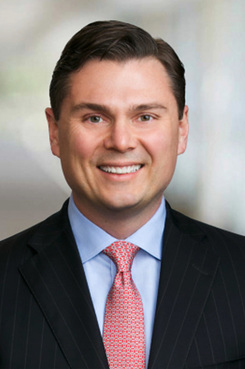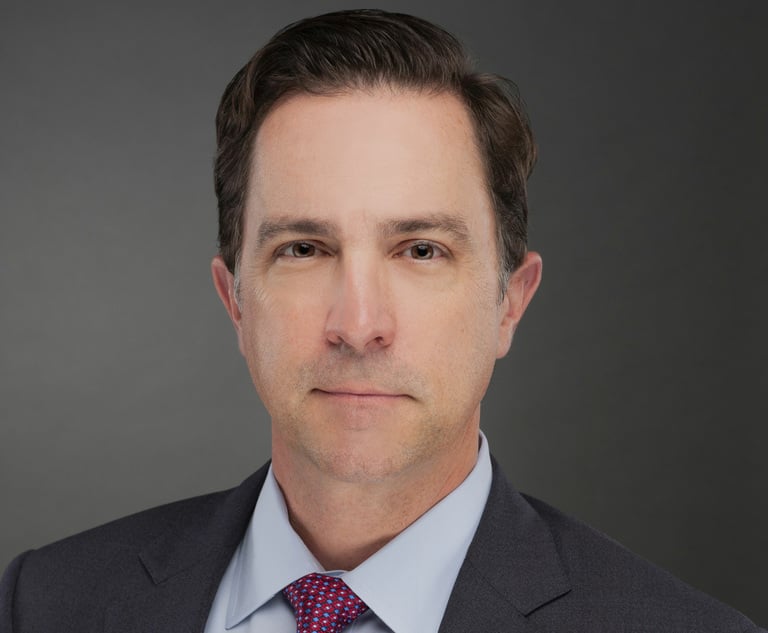Trial Firm YetterColeman Trains Young Lawyers for the Long Haul
"We want every lawyer we hire to be with us for their entire career," partner Collin Cox said.
June 10, 2019 at 02:29 PM
8 minute read
 Collin J. Cox, Yetter Coleman.
Collin J. Cox, Yetter Coleman.
Firm Name: YetterColeman
Firm Leader: Collin Cox, partner and member of management committee
Head Count: 33
Location: Houston
Practice Areas: We focus exclusively on representing plaintiffs and defendants in high‐stakes business and technology litigation, including contracts and business torts, intellectual property and antitrust/securities litigation. Our clients are primarily involved in the energy, technology and financial services industries, although we cover a broad range of industries.
The answers below were provided by Cox and edited lightly for style.
What is your firm's governance structure and compensation model?
Our team is high‐performing, so we hope to manage as little as possible and allow our lawyers to focus on their practices. That's one of the many benefits of knowing everyone personally at the firm. We have regular meetings of our lawyers to make sure everyone's input is heard. The business of running a law firm is complex, so we do have a small management committee that concentrates on major decision‐making for the firm. That works well for us. With respect to compensation, we operate in a hypercompetitive market, so we think about it all the time. We rely on data—both our metrics and from the market—to make sure our compensation model and approach reflect our culture. We have to attract, retain and reward high‐performers who provide our clients with superior service and contribute to the value we bring to every case.
Do you offer alternative fee arrangements?
Absolutely. We love entrepreneurial approaches that align the economic incentives between clients and the firm. We like to suggest creative relationships, including success‐based arrangements where we share risk and offer lower costs on the front end, and fixed fees that allow clients to manage to a set budget.
What do you view as the two biggest opportunities for your firm, and what are the two biggest threats?
It is a fantastic time to be a trial lawyer practicing in a boutique, especially given the strength and diversity of the economy and the volume and complexity of disputes where we get a chance to help. That said, it's clear that trial dockets are changing. Fewer lawyers really know how to try a case, because the chances to do so are dwindling. Although we love the counseling role our clients often hire us to provide, if a case is headed to trial, we know our lawyers are battle‐tested and ready to win. We also look for chances to team up with other top lawyers at different firms, as clients increasingly look to assemble a “virtual firm” for a particularly challenging case.
Another opportunity involves the energy industry. Being based in Houston, we naturally focus there as one of our core practices. We have great lawyers at every level who have done work in the upstream, midstream, downstream and service areas. As in any industry, you tend to see the same attorneys time and again, and we're always flattered when a prior opponent recommends us for a new matter.
With respect to threats, we face the same challenges that larger firms face related to business generation, talent management and compensation. We know that other firms covet our star young lawyers, so keeping them happy and engaged is a top priority. And with so many available technological capabilities, there's an increasing pace and emphasis on client communication, no matter the time. Today's environment requires a lot of focus on many fronts to operate competitively. But we love what we do, and we enjoy practicing together, so these threats aren't daunting. We embrace the challenge and are confident that we have a strong offering of top‐tier legal talent for current clients and those who haven't hired us yet.
The legal market is so competitive now—what trends do you see, and has anything, including alternative service providers, altered your approach? Is your chief competition other mid‐market firms, or is your firm competing against big firms for the same work?
The most interesting trend we see is litigation boutiques have caught up with larger firms in terms of reputation. Various rankings based on client and market perception bear this out, but more importantly, we are being hired on big cases that, not so long ago, would only have gone to the big firms. The market is voting for litigation boutiques every day. Another recent trend involves litigation funding, which provides clients with more options for sharing risk and to support worthy cases that otherwise might not be pursued. We see this as a very positive trend, and we've spent the time over the last few years to understand the industry and its major players.
There is much debate around how law firms can foster the next generation of legal talent. What advantages and disadvantages do midsize firms have in attracting and retaining young lawyers, particularly millennials?
We avoid using generational labels here, but we do understand how difficult it can be for lawyers of nearly any vintage to get substantive stand‐up experience given the trend of declining trials. We provide an attractive practice platform that is very different from that of larger firms—it is a decidedly entrepreneurial culture that places a great deal of value in providing early significant responsibility on important cases, collegiality and collaboration. We continually look for ways that younger lawyers can get substantial experience, and we assign cases and teams with that group's development specifically in mind. We want every lawyer we hire to be with us for their entire career.
Does your firm employ any nonlawyer professionals in high‐level positions (e.g. COO, business development officer, chief strategy officer, etc.)? If so, why is it advantageous to have a nonlawyer in that role? If not, have you considered hiring any?
Similar to our efficient staffing approach for clients, we have a small operations executive team whose strengths are focused on client service, finance and talent management. As a matter of practice, we regularly evaluate our structure and operations and are confident that our current structure is well‐aligned to support our growing firm to achieve our strategic performance goals.
What would you say is the most innovative thing your firm has done recently, whether it be technology advancements, internal operations, how you work with clients, etc.?
We've always had excellent appellate practitioners with national reputations. One thing we've done more recently is bring our appellate resources onto all of our big cases, to help us think through not only ultimate appellate issues but also the big legal issues that surface quickly in those sorts of cases. Related to that, we reject any attempt to put our attorneys into “silos.” For that reason, when we moved into our new office space last year, each of us took the same sized office, regardless of seniority, and we prioritized having great conference spaces, so our attorneys can spend even more time together. Our best ideas tend to come from team meetings, and in an era where any lawyer can close his door or work remotely, we want to create as much positive collaboration as possible.
Does your firm have a succession plan in place? If so, what challenges do you face in trying to execute that plan? If you don't currently have a plan, is it an issue your firm is thinking about?
Creating a culture is hard, but keeping a culture over the years is even harder. All of us feel extremely fortunate to practice together in the place that Paul Yetter founded over 20 years ago. Paul is one of the top trial lawyers in the country, and he's not going anywhere. But we know we need to plan for the future, because we want the firm to thrive for generations to come. So, over the past five to six years, we've invested significant time in a strategic plan that looked at our firm from every angle. We talk about “the next generation” literally every week. That focus on the future, along with our ongoing management, allows for a high degree of confidence that we will stand the test of time. I can't wait to see what this firm looks like in 20 years.
This content has been archived. It is available through our partners, LexisNexis® and Bloomberg Law.
To view this content, please continue to their sites.
Not a Lexis Subscriber?
Subscribe Now
Not a Bloomberg Law Subscriber?
Subscribe Now
NOT FOR REPRINT
© 2025 ALM Global, LLC, All Rights Reserved. Request academic re-use from www.copyright.com. All other uses, submit a request to [email protected]. For more information visit Asset & Logo Licensing.
You Might Like
View All
JCPenney Seeks Return of More Than $1.1M From Jackson Walker For Bankruptcy Work
3 minute read
Ex-Appellate Court Judges Launch Boutique Focused on Plaintiffs Appeals
2 minute read
O'Melveny, White & Case, Skadden Beef Up in Texas With Energy, Real Estate Lateral Partner Hires
5 minute read
Chamberlain Hrdlicka Taps a New Leader as Firm Follows Succession Planning Path
3 minute readTrending Stories
Who Got The Work
J. Brugh Lower of Gibbons has entered an appearance for industrial equipment supplier Devco Corporation in a pending trademark infringement lawsuit. The suit, accusing the defendant of selling knock-off Graco products, was filed Dec. 18 in New Jersey District Court by Rivkin Radler on behalf of Graco Inc. and Graco Minnesota. The case, assigned to U.S. District Judge Zahid N. Quraishi, is 3:24-cv-11294, Graco Inc. et al v. Devco Corporation.
Who Got The Work
Rebecca Maller-Stein and Kent A. Yalowitz of Arnold & Porter Kaye Scholer have entered their appearances for Hanaco Venture Capital and its executives, Lior Prosor and David Frankel, in a pending securities lawsuit. The action, filed on Dec. 24 in New York Southern District Court by Zell, Aron & Co. on behalf of Goldeneye Advisors, accuses the defendants of negligently and fraudulently managing the plaintiff's $1 million investment. The case, assigned to U.S. District Judge Vernon S. Broderick, is 1:24-cv-09918, Goldeneye Advisors, LLC v. Hanaco Venture Capital, Ltd. et al.
Who Got The Work
Attorneys from A&O Shearman has stepped in as defense counsel for Toronto-Dominion Bank and other defendants in a pending securities class action. The suit, filed Dec. 11 in New York Southern District Court by Bleichmar Fonti & Auld, accuses the defendants of concealing the bank's 'pervasive' deficiencies in regards to its compliance with the Bank Secrecy Act and the quality of its anti-money laundering controls. The case, assigned to U.S. District Judge Arun Subramanian, is 1:24-cv-09445, Gonzalez v. The Toronto-Dominion Bank et al.
Who Got The Work
Crown Castle International, a Pennsylvania company providing shared communications infrastructure, has turned to Luke D. Wolf of Gordon Rees Scully Mansukhani to fend off a pending breach-of-contract lawsuit. The court action, filed Nov. 25 in Michigan Eastern District Court by Hooper Hathaway PC on behalf of The Town Residences LLC, accuses Crown Castle of failing to transfer approximately $30,000 in utility payments from T-Mobile in breach of a roof-top lease and assignment agreement. The case, assigned to U.S. District Judge Susan K. Declercq, is 2:24-cv-13131, The Town Residences LLC v. T-Mobile US, Inc. et al.
Who Got The Work
Wilfred P. Coronato and Daniel M. Schwartz of McCarter & English have stepped in as defense counsel to Electrolux Home Products Inc. in a pending product liability lawsuit. The court action, filed Nov. 26 in New York Eastern District Court by Poulos Lopiccolo PC and Nagel Rice LLP on behalf of David Stern, alleges that the defendant's refrigerators’ drawers and shelving repeatedly break and fall apart within months after purchase. The case, assigned to U.S. District Judge Joan M. Azrack, is 2:24-cv-08204, Stern v. Electrolux Home Products, Inc.
Featured Firms
Law Offices of Gary Martin Hays & Associates, P.C.
(470) 294-1674
Law Offices of Mark E. Salomone
(857) 444-6468
Smith & Hassler
(713) 739-1250






